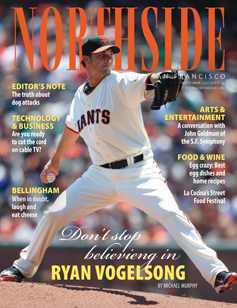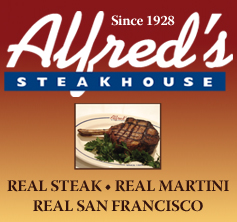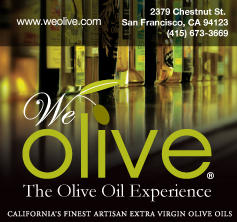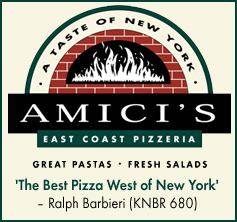Dennis Herrera, San Francisco’s city attorney, grabbed quite a few headlines last year. It was mostly good news for his office, though he concedes the financial problems of the city, and the state, remain formidable as we enter 2010.
“The deficit will be a major challenge to anyone who wants to be this city’s next mayor,” says Herrera. Though circumspect, it’s no secret to any political observer that he might like to be considered for that job.
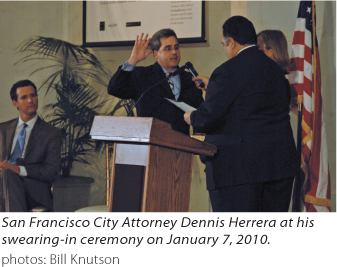
Herrera was born 47 years ago in Bay Shore, Long Island, N.Y. He went to Villanova and got his law degree at George Washington School of Law. He was chief of staff to the U.S. Maritime Administration in Washington D.C., practiced maritime law in San Francisco, and was appointed to the S.F. Transportation Commission by Willie Brown. Herrera served as a police commissioner and was elected commission president.
In 2001, he was elected city attorney and was re-elected last November to a third term.
We spoke with Herrera at his office at City Hall just before Christmas. We began with a remedial question.
Northside S.F.: First, by way of background, perhaps you could explain the differences between the city attorney’s office and the district attorney’s office.
Herrera: Sure. The district attorney is a county office, not a city office. Because we are the only co-contiguous city and county, we have a district attorney for both the city and county of San Francisco. The district attorney is responsible for prosecuting criminals, prosecuting criminal conduct. That’s what they do. We do everything else. We are the city’s lawyer. We are the general counsel who advises the over 100 city departments, agencies and commissions. We draft all legislations. We negotiate all contracts. We do labor negotiations. Whenever the city gets sued, we defend the city. Whenever we have a claim, I make the decision to move forward in the name of the city and county. I can step into the shoes of the attorney general and sue in the name of the people of the state of California, and in the name of three other city attorneys, and the district attorney. I have that power, but we use it in a civil context, such as consumer protection, public nuisance, and all that. But I cannot prosecute criminals, either misdemeanors or felonies.
Northside S.F.: So you can try to shut down the Bridge Motel in the Marina on the basis that it may be a public nuisance. Herrera: That’s right. There is an area where perhaps it’s not really a crossover, but it’s quasi-criminal such as the Bridge Motel case, though it may appear criminal to the public. I can use public nuisance laws to support going after someone subject to some criminal liability as well. My gang injunction work uses the power of the civil law to try and bring something to bear on a criminal problem. But that’s me bringing a tool from the civil side. That’s where the two offices can be complementary to each other.
Northside S.F.: So how do you sue a street gang? Do they have a general counsel, too?
Herrera: If you look, you can sue them as an unincorporated association or entity. But also if you look at the gangs, I also went after the individuals, and documented by clear and convincing evidence [the standard that has to be met in court] that they, each individual member of the gang, that they were creating a public nuisance, and that their associating together created a public nuisance.
Northside S.F.: You convinced the vast Kellogg’s corporation to change their packaging on Cocoa Krispies when the cereal giant implied the sugary cereal was good for the immune systems of children. Is it fun to take on a behemoth like Kellogg’s?
Herrera: Well first let me say, we do a lot of consumer protection. After I wrote that letter to Kellogg’s, some people said, “Wow, that was a great thing that he did.” Others said, “Is that what he should be spending his time on?”
A couple of things. Number one, I can chew gum and walk at the same time. We’re a major law office with 350 people. Just because you’re paying attention to one thing does not mean you’re neglecting something else. Look at the result. It wasn’t as if I was filing a piece of litigation. I filed a three-page letter. Within two days, under the threat that we might do something, and with the media attention, Kellogg’s said they were going to pull the stuff off the shelves. That tells me that they didn’t have the facts to back up what they were doing, and there is a role for public entities – even if they’re at the local and state level – to be involved with consumer protection issues that have an impact nationwide. Let me tell you what I mean by that. A lot of federal agencies – the FDA would be one, and others – after eight years of the Bush Administration, they were doing no regulation of their respective industries at all. So I think it’s incumbent on local and state authorities to step into that void until the FDA and other federal agencies are going to do their job[s]. That what we did in this case. We were doing a service for the residents of this city, the residents of the state, the residents of the country.
Here we are having a big, long discussion at the federal level of health care reform. One of the leading causes of health problems, and the explosion of health care costs, is related to child obesity. There are problems you get with people’s access to nutrition and the impact that has on their health, and how they might be uninformed about the consequences. We have to put our foot down and say to companies who are taking advantage of this lack of education, “You’re going to lay out the facts and be truthful so the public has a right to understand the quality of the nutrition they are getting.” I think it’s an important thing.
Northside S.F.: Similarly there was your successful battle with Walgreen’s over selling tobacco products in the stores. That was another issue that drew national attention.
Herrera: There are things I take on my own initiative, like the Kellogg’s thing or when I’m defending an action by the mayor or the board. It’s my duty to enforce the law and make sure that ordinances are adhered to. Now this office had a long history being involved with tobacco-related lawsuits, so we had a lot of experience with that. The First Amendment claim that was being made by Philip Morris in that case, I thought, was pretty ridiculous, so I was not surprised when we were victorious.
Northside S.F.: Speaking of the Board of Supervisors, your job is very political – you were just re-elected in November, running unopposed – is there any friction between you and the supervisors or anyone else here at City Hall over politics?
Herrera: This position is unique. Every department, division, entity, every city official, is your client. So the city attorney represents the city and county as an entity. Not individually, but we treat them all, for purposes of attorney-client privilege and the like, as individuals. It’s incredibly important when you hold this office that you navigate the fulcrum and you make your decision based on the facts of the law, on the advice that you give, or on the opinions that you have to give. I’ve had remarkable success – the office has had remarkable success – to remain professional and retain our integrity. People in this building recognize this. It’s hard to quantify. Often you’re called upon to be a counselor or a mediator between people in the building, but often with the people from the building and outside constituencies, too. If people think you’re going to build a political agenda, you’ve lost your ability to be effective in the job. When it comes to how I deal with my clients, I call it like a professional lawyer. We’ve been at it eight years now. I think we’ve been successful in keeping that integrity. Even when I’ve had a beef, it’s all respectful. They may disagree, but it’s always respectful.
Northside S.F.: Yes, but you must hear people in the hallways who might mutter, “There goes Herrera, he wants to be mayor. I want to be mayor, too.” And the attendant grumbling … you know.
Herrera: I have not experienced that with any of my clients [here at City Hall]. Part of that is because we have a history in this office. People see how we conduct the office. I have not had an experience where someone has questioned the way I have handled their thing because they think I have some kind of political agenda.
Northside S.F.: But you do want to be mayor though, right?
Herrera: I’m concentrating on being the best city attorney I can be. I just got through a re-election campaign [and] my third term. I’d be a liar if I said I wasn’t thinking about it. As things go along and I take a more serious look at 2011, I’ll let people know that.
Northside S.F.: I guess as a city attorney and an elected official, you have both clientele and a constituency.
Herrera: You brought something up. Hey, I’m an elected official too. So at the same time, you have to be responsive to the public. There’s a way to do that without violating your duty to being the city’s attorney. Often times, particularly when it comes to code enforcement work … you mentioned the Bridge Motel. Going after the Bridge Motel was serving an interest that the public was demanding. So sometimes the only interaction a group or a citizen may have is with someone in my office. My guys might be the only ambassadors of what the city can do that this individual may have contact with. Just because the entity is the client, that does not mean it’s mutually exclusive to the pursuit of justice for the citizens. Sometimes that’s a good match.
Northside S.F.: Is it true that there are 4,000 claims against the city every year? Mostly Muni claims?
Herrera: Sometimes it’s more. Yes, a good part of that involves defending lawsuits against Muni. I will tell you there are some cases that involve liability, and there are cases that do not involve liability – but they still cost money. We vigorously defend cases where we think Muni did not do anything wrong. We’re successful a good deal of the time. Yes, there are times we settle. And there are times when there’s a verdict against the city. Muni is certainly a large client – all that equipment out on the street – there are cases we’re going to get, [and] we just have to deal with them.
Northside S.F.: Do you have a favorite part of town?
Herrera: I love the part of town that I live in. People had never heard of it when I bought a place there in 1993 – Dogpatch. In those days, no one went down there. It’s incredibly eclectic, different things popping up, [a] big cross-section of folks. I love Potrero, essentially our neighbors – good transportation, the weather, good restaurants. I also love North Beach. That’s what I love about the City. The neighborhoods all have their little quirks. That’s what makes the City so interesting. It’s great in that regard.
E-mail: bruce@northsidesf.com




 Herrera was born 47 years ago in Bay Shore, Long Island, N.Y. He went to Villanova and got his law degree at George Washington School of Law. He was chief of staff to the U.S. Maritime Administration in Washington D.C., practiced maritime law in San Francisco, and was appointed to the S.F. Transportation Commission by Willie Brown. Herrera served as a police commissioner and was elected commission president.
Herrera was born 47 years ago in Bay Shore, Long Island, N.Y. He went to Villanova and got his law degree at George Washington School of Law. He was chief of staff to the U.S. Maritime Administration in Washington D.C., practiced maritime law in San Francisco, and was appointed to the S.F. Transportation Commission by Willie Brown. Herrera served as a police commissioner and was elected commission president.